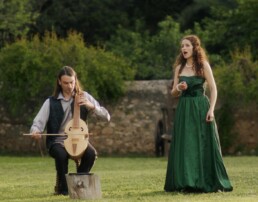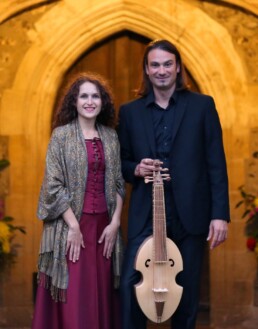Summer concert at the Diocesan Museum in cooperation with the Rottenburg Music SchoolSunday, 24 July 2020, 7 pm
Segreti accenti
Italian and Spanish music from the Renaissance and early Baroque periods
Duo Cantar alla Viola
Nadine Balbeisi, voice
Fernando Marín, viola da gamba
Towards the end of the 16th century, a new type of vocal music emerged in Italian art music alongside the polyphony that had prevailed until then: solo singing accompanied by one or more instruments. At the princely court of Ferrara, this style was called musica segreta because of its exciting novelty and exclusivity. Polyphonic pieces were often subsequently adapted for monodic performance, such as the three-part villanelles by Luca Marenzio or the three- to four-part tonos humanos by Juan Blas de Castro, which are heard in concert. The members of the ensemble Concerto delle Donne, made up of ladies of the court, were challenged by the new trend to develop their singing technique to the point of virtuosity; in doing so, they encouraged other female singers to venture into professional careers for the first time in music history. Their concerts also inspired composers such as Giulio Caccini in Florence, who is considered the founder of opera. His two daughters Francesca and Settimia were not only successful singers but also became known as composers. Francesca wrote several operas, one of which has survived, and in 1618 a Libro delle musiche, published in print, with solo songs and duets, from which the two pieces in the evening are taken. Her sister Settimia Caccini took on the role of Venus in Claudio Monteverdi’s opera L’Arianna and was praised for it by the composer for her “superhuman grace and angelic voice”. Fortunately, some of her songs have been preserved in a manuscript in the archives of the Lobkowicz noble family in Prague.
The Jordanian-American soprano Nadine Balbeisi began her international career from Germany. Her repertoire ranges from 14th century music to a variety of classical operatic roles. She has received international awards and grants, currently funding for a research project on 17th century Italian music from the German Music Council. Her CD “Lamentarium” with the Ensemble Atalante was voted “Recording of the Year 2011” by Musicweb International.
She also shows her versatility in the trio “Viola da Samba”.
The gambist and cellist Fernando Marín, who comes from Alicante in Spain, specialised in string instruments of the Renaissance and Baroque periods in historical performance practice, earned his doctorate at the University of Barcelona with a dissertation on the Spanish vihuela de arco and conveys his research results and instrumental art in several solo CDs. In the duo “Cantar alla Viola”, which was founded in 2005 and has already recorded several CDs with Spanish, Italian and English music, Marín brings the now forgotten art of song accompaniment with a string instrument to perfection, thanks to a special bowing technique also with polyphonic chords and tone sequences. In Rottenburg, he will play on a vihuela de arco modelled on a historical instrument.
Free admission, donations requested.

